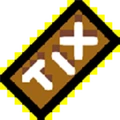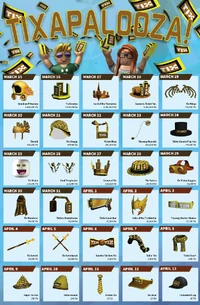BundleofYoy (talk | contribs) No edit summary |
Dragonzlayer80 (talk | contribs) m (Not exactly a piece of trivia since the discontinuation of BC has nothing to do with the discontinuation of tickets.) |
||
| Line 67: | Line 67: | ||
* The Tix logo was updated about a year after the removal of tix. |
* The Tix logo was updated about a year after the removal of tix. |
||
* Many users left Roblox for good due to this change. |
* Many users left Roblox for good due to this change. |
||
| − | * 3 Years after the discontinuation of Tix, [[Builders Club]] was discontinued changing the economy drastically once again. |
||
== References == |
== References == |
||
Revision as of 03:36, 3 October 2019

Tix logo prior to removal

Original Tix icon
Tickets (Tix for short) were a form of currency on Roblox, introduced on August 2, 2007. Compared to the primary currency, Robux, Tix had very little value. Tix were earned by players through various methods, including visiting the site daily and having other users visit their Place. Tix could be spent on Catalog items and on advertisements. They were mainly used to buy things from the catalog. At the same time, Tickets also did not require payment and any registered account could earn them. Tix could also be converted into Robux through the RoblEX system, and vice-versa.
On April 14, 2016, Tix were removed by Roblox and any remaining balances were forfeited. There are still methods available to view a user's Tix balance through web APIs, but they are static due to the removal.
Ways To Have Obtained Tickets
- Login bonus: Users earned 10 tickets as a daily login bonus (until March 2016).
- Ambassador program: Users earned 2 tickets for each external link leading to Roblox they created was clicked.
- Place visits: Users earned 1 ticket for each visit. If the place was Builder's Club only, each visit would give 10 tickets to the owner.
- Currency exchange: You could exchange Robux for tickets. The value varied based on the state of the market.
- Selling clothing: Users could earn tickets by making clothing such as T-shirts, Shirts, and Pants. Non-paying users earned 10% of the price tag and 90% if they were in the Builders Club.
RoblEX (Trade Currency)
RoblEX, commonly known as the Currency Exchange, was a feature which allowed users to trade in their Tickets for ROBUX and vice versa. This, in turn, created the Roblox economy as the price of Tickets and Robux changed through supply and demand. Users could earn a substantial amount of profit by buying a large amount of Robux for a lower price, then exchange them later for a larger sum of Tickets.
Along with Tickets, RoblEX was removed on April 14, 2016.
Discontinuation
Announcement (March 15, 2016)
Picture from the official ROBLOX site when Tickets was still a currency.
On March 15, 2016, Roblox announced through a blog post that tickets would be discontinued the following month, claiming that the currency was causing "confusion and delay" for many first-time users. This may be because Roblox has been undergoing financial difficulties. Despite what most people believe, no evidence has ever been shown that they were undergoing financial difficulties. As a result, players who were unable to pay for Robux went to extreme measures just to have currency on their account. This is a reason why spam bots are extremely common, and why some fall for it.
Picture from the official ROBLOX site that shows Tickets is no longer a currency.
However, around 2017, players began speculating that the true reason that Roblox removed tickets, were due to players using bot accounts to obtain free tickets in various ways, such as Place Visits, or through transactions. Because of players botting, this resulted in players being able to convert all of these obtained tickets into unlimited amounts of Robux within seconds.
This was partially confirmed in a ROBLOX Blog post.
"The impetus (reason) behind removing tickets is not to make more money. The primary reasons have always been product simplicity, botting, and not incentivizing certain behaviors." -David Baszucki
Tixapalooza (March 15 - April 14, 2016)
The Roblox staff also intended to release more free items on the catalog so customizing avatars without Robux would be creative and rich, and they believe Roblox would be simplified from the UI to the catalog to user accounting. This was also done to remove the incentive for users to log in daily for a ticket bonus and create alt (alternate) accounts, as players had done to gain currency prior to March 2016. Roblox was migrating to a community-controlled catalog which would allow developers to make body parts, hats, gear items, animations, and other assets.[1]

Commemorative items that were released between March and April 2016.
Roblox also announced plans to unveil a new rich achievement and reward system to replace the Ticket bonus.
The price floor of catalog items was lowered to 5 Robux to compensate for these changes. Items sold with a Ticket price will have their price converted to Robux at a rate of 17:1.
Not all catalog items underwent an automatic conversion to its value according to the rate. On May 5, 2016, a hat called "Gentleman's Spring Hat" was temporarily sold for 100 tickets on the catalog by mistake. This was changed two days after release to 100 Robux, but some players got the hat before the price was fixed. Another one was "Shaggy" which was a cheap hair sold for 50 tix which were later made limited and is selling currently for 439 Robux, and the price is slowly increasing. The Shaggy was many Robloxians' favorite hair and it was unexpected for the Shaggy not to go free after the Tix removal.
The Tixapalooza was an event to celebrate the removal of tickets. Exclusive, commemorative items were sold in the catalog from March 15, 2016, to April 14, 2016. Currency trading rates were expected to fluctuate during this time period.[2]
At the start of the discontinuation of Tickets, daily Ticket bonuses were removed to prevent farming Tickets for currency exchange purposes. While it did help the economy in a way, it made it difficult for non-Builders Club users to afford the Tixapalooza event items.
These changes were first tested on Roblox's gametest1 testing site to test the economy before implementing this change. This was done to see if removing Tickets was a viable option.
Tons of users were unhappy and angry with this change and voiced their disapproval on the Forums. This also made users believe that Roblox is greedy, and a some users even left Roblox for good.
Post Tix Removal (April 15, 2016 - present)
Tickets were not automatically converted to Robux if they were not spent before April 14, 2016. This meant that if an inactive player did not convert all his/her tickets to Robux by April 14, 2016, they lost access to their ticket balances and would be unable to convert them to Robux after that date.
- For example, if you had 3080 tickets and 100 Robux on your account and chose not to convert the former, you would still have the latter amount as of April 15, 2016 but you would be unable to use the Tickets in any way.
- Ever since the Tix removal, scams have skyrocketed, due to the fact that Robux can now only be obtained through purchase with real currency, clothing, trading, group funds, etc.
- While Tickets are now gone, they were not actually removed from the website entirely. They were just hidden and can't be used in any way, as seen here . The same goes for transaction history; those who have purchased or sold using Tickets can still see them in their transaction history.
- Several users have called this event "The Great Depression of 2016", as people who relied on ticket-to-Robux trading for profit lost their only way of getting money without paying.
- Some users believed this change was an April Fools' Day joke, as the announcement and removal took place on March 15, which was in between March and April.
- The Tix logo was updated about a year after the removal of tix.
- Many users left Roblox for good due to this change.

